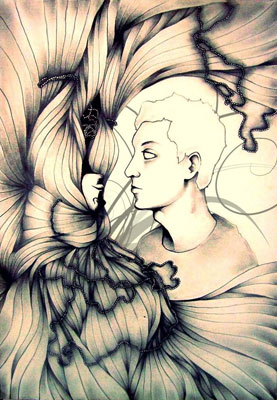All Nonfiction
- Bullying
- Books
- Academic
- Author Interviews
- Celebrity interviews
- College Articles
- College Essays
- Educator of the Year
- Heroes
- Interviews
- Memoir
- Personal Experience
- Sports
- Travel & Culture
All Opinions
- Bullying
- Current Events / Politics
- Discrimination
- Drugs / Alcohol / Smoking
- Entertainment / Celebrities
- Environment
- Love / Relationships
- Movies / Music / TV
- Pop Culture / Trends
- School / College
- Social Issues / Civics
- Spirituality / Religion
- Sports / Hobbies
All Hot Topics
- Bullying
- Community Service
- Environment
- Health
- Letters to the Editor
- Pride & Prejudice
- What Matters
- Back
Summer Guide
- Program Links
- Program Reviews
- Back
College Guide
- College Links
- College Reviews
- College Essays
- College Articles
- Back
Growth & Development
My first encounter with existentialism was in sixth grade. I had exhausted the curriculum and had a tendency to finish my homework very early every night, so I had quite a bit of free time on my hands. I picked up an old book of my mother’s and was immediately intrigued by its weathered, stiff pages. I loved the feeling of old books. I brought it into school after I had spent a few hours trying to get through the first thirty pages and I kept my new book on top of my desk for the entire day, showing my progress with a thin, red bookmark. I finished the book about two weeks later and read it as a plainly written story about a confused man. I never assumed anything more of the book, until I read it again in the summer before ninth grade. I read this book and suddenly understood what I had missed. It was almost as though I had read a different book. It spoke through the main character about existence and action, although emotion was always absent. I realized that this was the purpose of the novel; to look at life as simply existence. I agreed with this ideology and incorporated it into my daily life in minor ways, trying to look at issues I faced in a new light. I never completely subscribed to existentialism, because I believed it was too harsh of a generalization and to remove emotion or the importance of emotion in my life would be too significant of a loss. Although there was one important idea I did come to subscribe to by the means of an existentialist outlook. I came to the conclusion that if everything exists is tangible and our actions always directly cause our results, how could there be a higher power controlling us? I became skeptical, and then I transformed into an agnostic. More like an agnostic atheist. I believed that if there was proof of a god’s existence, I would believe, although without proof I did not believe at all.

Similar Articles
JOIN THE DISCUSSION
This article has 1 comment.

8 articles 0 photos 624 comments
Favorite Quote:
I do the best imatation of myself- Ben Folds